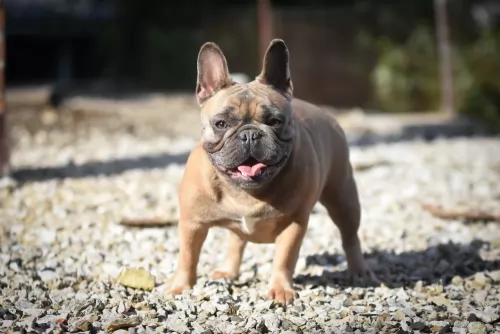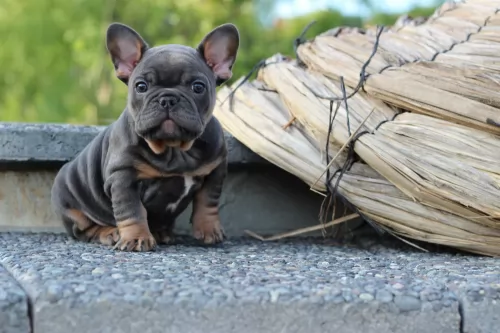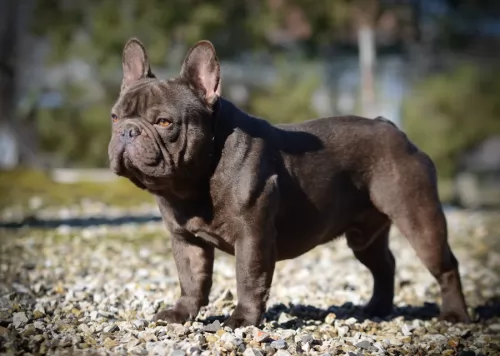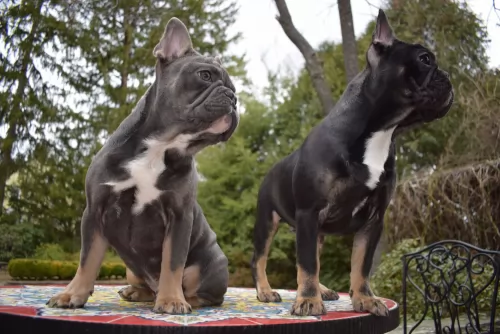 Petzlover
Petzlover French Bulldog is originated from France but Boston Terrier is originated from United States. French Bulldog may grow 8 cm / 3 inches shorter than Boston Terrier. Both French Bulldog and Boston Terrier are having almost same weight. Both French Bulldog and Boston Terrier has almost same life span. Both French Bulldog and Boston Terrier has almost same litter size. Both French Bulldog and Boston Terrier requires Low Maintenance.
French Bulldog is originated from France but Boston Terrier is originated from United States. French Bulldog may grow 8 cm / 3 inches shorter than Boston Terrier. Both French Bulldog and Boston Terrier are having almost same weight. Both French Bulldog and Boston Terrier has almost same life span. Both French Bulldog and Boston Terrier has almost same litter size. Both French Bulldog and Boston Terrier requires Low Maintenance.
 The french bulldog originated in England and are bred expecting small size bulldogs. Many lace workers in Nottingham had little bulldogs and when they emigrated to france, they brought their dogs with them. Soon they become popular in France and Europe. Then Americans showed interest in them.In 1896 frenchie was shown in United states in a show and after that they got their nickname "Frechie".
The french bulldog originated in England and are bred expecting small size bulldogs. Many lace workers in Nottingham had little bulldogs and when they emigrated to france, they brought their dogs with them. Soon they become popular in France and Europe. Then Americans showed interest in them.In 1896 frenchie was shown in United states in a show and after that they got their nickname "Frechie".
 Nicknamed the American Gentleman, the Boston Terrier is the result of crossing the British Bulldog with the white English Terrier. At first the Boston Terrier was bred to be a fighting dog, but since then, undesirable characteristics have been bred out and today the Boston Terrier is regarded as an indoor dog that doesn’t tolerate extreme weather conditions.
Nicknamed the American Gentleman, the Boston Terrier is the result of crossing the British Bulldog with the white English Terrier. At first the Boston Terrier was bred to be a fighting dog, but since then, undesirable characteristics have been bred out and today the Boston Terrier is regarded as an indoor dog that doesn’t tolerate extreme weather conditions.
The breed emerged in the 1870s when Robert Hooper from Boston bought a dog thought to be a mix of a Terrier and Bull type lineage. A specialist breed club was formed in 1891 and in 1979 the commonwealth of Massachusetts named the Boston Terrier the Official State Dog. By the 20th century, the breed’s color and patterns were standard and an essential feature.
 Frenchie is a good companion dog and has a powerful muscular body. They like to play but also likes to relax for more time. They are intelligent and training them is very easy until they think it a game. They are free thinkers and are not very good in obedience. Frenchies should not be leaved alone for a long time.They love spending time with humans and generally they get along with everyone. They are excellent watchdogs and alerts when strangers come.
Frenchie is a good companion dog and has a powerful muscular body. They like to play but also likes to relax for more time. They are intelligent and training them is very easy until they think it a game. They are free thinkers and are not very good in obedience. Frenchies should not be leaved alone for a long time.They love spending time with humans and generally they get along with everyone. They are excellent watchdogs and alerts when strangers come.
French bulldog suits very well in apartments. But they should be made to walk for fifteen minutes daily to avoid over weight. They should not be kept outside on hot days. Frenchies will be very happy if you stay in home. They will follow you wherever you walk inside the house. They love people so much, such that people who own a Frenchie can not imagine life without them.
 The Boston Terrier is a lively, strong-willed breed with an alert expression and fairly large, erect ears. He is a small to medium sized dog and his square muzzle puts him among the Bull breeds.
The dog is compact in build and varies quite significantly in size. Weight with the dog is actually divided into 3 categories – lightweight (under 6.8kg), middleweight (up to 9kg) and the heavyweights being between 9.1kg and up to 11.4kg. The Boston has a short head and a naturally short, low-set tail. The coat is short and smooth, and the colour can be brindle with white markings, brown and white or black and white.
The Boston Terrier is a lively, strong-willed breed with an alert expression and fairly large, erect ears. He is a small to medium sized dog and his square muzzle puts him among the Bull breeds.
The dog is compact in build and varies quite significantly in size. Weight with the dog is actually divided into 3 categories – lightweight (under 6.8kg), middleweight (up to 9kg) and the heavyweights being between 9.1kg and up to 11.4kg. The Boston has a short head and a naturally short, low-set tail. The coat is short and smooth, and the colour can be brindle with white markings, brown and white or black and white.
It’s the energetic liveliness of the Boston Terrier that makes him such a lovable and popular pet. He has an affectionate, gentle nature that makes him a fantastic family pet and he gets on well with children and pets in the home. He can adapt to city or country life. One or two interesting facts of this breed are -
with his short nose, he is prone to drool and snore
he is prone to corneal ulcers because of his large, somewhat protruding eyes
with a small pelvis, the females often battle with the birthing process and may require a caesarean section.
 They are good children friendly dogs as they like to play with them. It will be good if they are supervised by an adult.
They are good children friendly dogs as they like to play with them. It will be good if they are supervised by an adult.
They are polite with everyone including other pets. They love to play games and chase balls but don't need much exercise.
Frenchies adapts well for apartment living but they don't like being alone for long time. They will not tolerate both hot and cold weather and so air conditioning will be better.
French Bulldogs are easy to train and are very much interested in playing.
 The Boston Terrier is such a sweet little dog, but you can’t really say what your puppy’s personality will be as personality varies quite a bit between individual Boston’s. Remember that just like with a human child, your puppy will turn out with characteristics that can be attributed to the way he was raised. The Boston just loves his human family and he wants to be part of all your activities, even though he may gravitate towards one favorite family member.
The Boston Terrier is such a sweet little dog, but you can’t really say what your puppy’s personality will be as personality varies quite a bit between individual Boston’s. Remember that just like with a human child, your puppy will turn out with characteristics that can be attributed to the way he was raised. The Boston just loves his human family and he wants to be part of all your activities, even though he may gravitate towards one favorite family member.
Your Boston is a Terrier and that means he is full of life and will require being exercised by you. He can’t just be left outdoors day after day because this is one particular breed that can’t adapt to changing weather conditions. He likes being inside where the temperature is more even. Look after your Boston, because if you do, you’ll be rewarded by having one of the best friends you’ve ever had.
 Frenchies can suffer from Von Willebrand's disease(VWD)and thyroid condition. Due to their flat faces they suffer from elongated soft palate or cleft palate. Because of their compacted air way they have inability to effectively regulate temperature.
Frenchies can suffer from Von Willebrand's disease(VWD)and thyroid condition. Due to their flat faces they suffer from elongated soft palate or cleft palate. Because of their compacted air way they have inability to effectively regulate temperature.
Any indication that the hair is unhealthy, such as brittleness and hair loss, should be addressed immediately to avoid any further damage. Hair loss becomes a problem when it becomes excessive, possibly due to disease or a particular condition.
 Boston Terriers are generally healthy, feisty little dogs but it is always wise to know that you may well come across some health conditions that can affect your pet.
Boston Terriers are generally healthy, feisty little dogs but it is always wise to know that you may well come across some health conditions that can affect your pet.
Your Boston may well have to contend with cataracts, and in the dog world, this isn’t only an ailment for old dogs. Juvenile cataracts can develop in young puppies already. Cherry Eye is another eye problem with a prolapse of the gland of the third eyelid. It is also an eye disease than can be found in young dog of less than a year old.
Boston Terriers actually have a fairly high incidence of deafness in one or both ears. White Bostons tend to produce more puppies with deafness.
The Boston Terrier is a brachycephalic dog and therefore more predisposed to Brachyphalic Syndrome where the dog battles to breathe because of too much soft tissue which forms in the airways.
To avoid many dog diseases with your Boston, buy your puppy from a reputable dog breeder who screens dogs used in a breeding program as this prevents puppies inheriting genetic disorders.
 As with all dogs, proper nutrition makes your French Bulldog a happy, healthy pup. He should have his own food and water bowls. Don't feed your French bulldog puppy, uncooked meat or food that may have gone bad. Young puppies need relatively large amount of food in order to meat the demands of their rapidly growing bodies and their hectic lifestyle. Feed your puppy specially designed chewing treats from reputable pet stores.
As with all dogs, proper nutrition makes your French Bulldog a happy, healthy pup. He should have his own food and water bowls. Don't feed your French bulldog puppy, uncooked meat or food that may have gone bad. Young puppies need relatively large amount of food in order to meat the demands of their rapidly growing bodies and their hectic lifestyle. Feed your puppy specially designed chewing treats from reputable pet stores.
According to the French BullDog Club of America, there are no specific guidelines for feeding them. Options for feeding your French Bulldog are commercial dry food, canned food, raw food and homemade meals. Calories required for frenchie varies depending on size, age, activity level and metabolism.
Frenchies can be made to walk or run for a particular distances. Heavy exercises should not be given as they face respiratory problems. Avoid exercising them in hot weather as they have chances of getting heatstroke.
 The Boston Terrier is a lively dog, and even though he doesn't have any extreme exercise requirements, he will still require you exercising him by taking him on walks, or having ball games with him. As an essentially indoor dog, he can even enjoy some quieter indoor games.
The Boston Terrier is a lively dog, and even though he doesn't have any extreme exercise requirements, he will still require you exercising him by taking him on walks, or having ball games with him. As an essentially indoor dog, he can even enjoy some quieter indoor games.
You’ll be able to gauge how much your pet requires in terms of high quality food, but by the time he is an adult, he usually has one or two bowls of food a day. Size and age play an important role in determining his eating habits. Home made foods made up of rice, meat and vegetables are always welcome for your pet and these can be added into his top quality commercially produced dog food. For a healthy dog who is free of skin problems include some raw meat in the diet from time to time. Always make sure that there is a bowl of fresh, cool water which is available 24/7.
With his short coat, the Boston Terrier isn’t a heavy shedder and is low maintenance in terms of keeping his coat groomed. Brush him at least twice a week to remove loose hairs and to also prevent flea and tick infestations. Brush his teeth 2 or 3 times a week to ensure no plaque build-up which can damage the teeth. Never use human toothpaste, but invest in special toothpaste and -brush for dogs. If he is essentially an indoor dog, you may have to get the vet to trim his nails too.